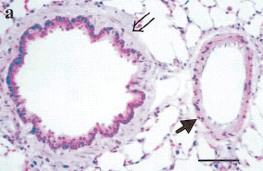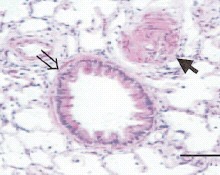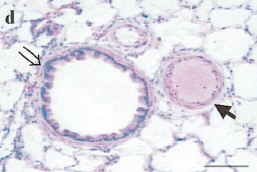New gene therapy uses body’s own cells for delivery
November 28, 2001 | Source: KurzweilAI
A radically new type of gene therapy for correcting genetic defects and treating pulmonary hypertension has been developed, based on research supported by United Therapeutics and Northern Therapeutics.
Announced at the recent American Heart Association conference, the new process would use a sample of the patient’s own skin cells, which are transfected (combined) with a corrective gene (Vascular Endothelial Growth Factor) and then injected back into the patient’s bloodstream.
Like nanobots, the cells migrate to the lungs to deliver the genetic payload. When they reach the narrow capillaries in the lungs, they are compressed, causing the genes to be expressed (ejected) into the lung tissues.

Normal lung cells (rat)

Pulmonary hypertension – note hypertrophy

After cell-based gene therapy
Since the patient’s own cells would be used, immune rejection and inflammation effects — serious drawbacks with the conventional viral gene delivery procedure — are avoided, according to research team leader Dr. Duncan Stewart.
“Cell-based gene transfer is very promising. It provides long lasting effects and it looks quite safe,” said Stewart. Currently, the adenovirus (common cold virus, deactivated) is used to deliver the gene into the target cells, he explained. That can cause severe immune-rejection effects, resulting in death in one recent case.
The researchers are using the Vascular Endothelial Growth Factor (VEGF) gene in a rat model. “The fact that is works well in pulmonary hypertension suggests that it could be used to regenerate new blood vessels. That suggests we could take patients at the end stage of a disease and regress them to make them better.”
Similar cell-based research is ongoing for other types of body tissues, such as heart and brain tissue, he said, adding that this novel approach could in the future lead to revolutionary new forms of treatment for a wide variety of illnesses.
